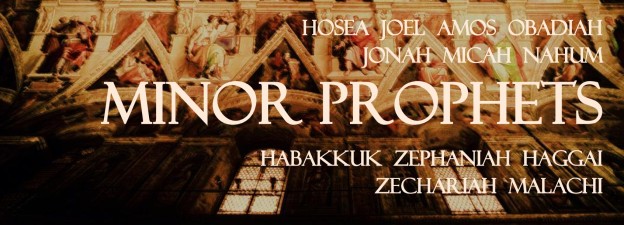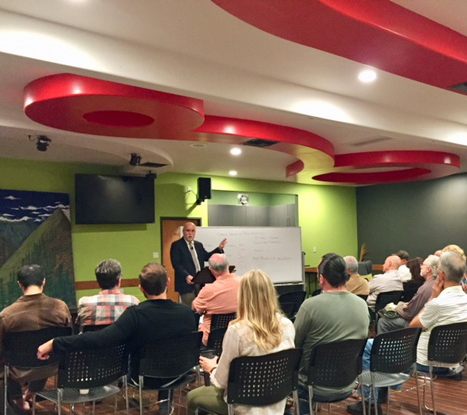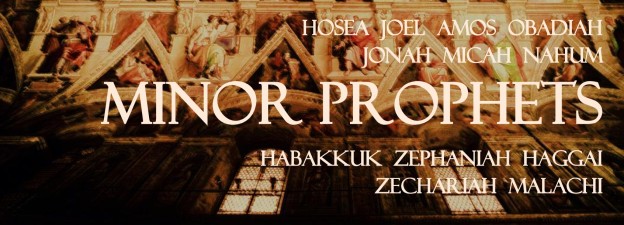Apologetics in a Post Christian Age (Audio) -- Making the Case for Christianity (New Testament Textual Criticism)
 Friday, March 15, 2019 at 11:40AM
Friday, March 15, 2019 at 11:40AM
Living in Light of Two Ages
____________________________
 Friday, March 15, 2019 at 11:40AM
Friday, March 15, 2019 at 11:40AM  Wednesday, March 13, 2019 at 09:52AM
Wednesday, March 13, 2019 at 09:52AM 
An Introduction to the Minor Prophets (4)
He appears on the scene unexpectedly, possessing the miraculous ability to close or open the heavens so as to bring drought or abundant rain. We know very little about his background and origins, but he is best known for his confrontation with prophets of Baal on Mount Carmel. He comes as a new Moses who raises the dead. He confronts the apostate king of Israel, Ahab, and his Baal worshiping wife, Jezebel. He is taken up into heaven in a chariot of fire, and the last two verses in the Old Testament (Malachi 4:5-6) speak of his re-appearance as the sign of the dawn of the messianic age and the coming of Jesus. He appears with Moses and Jesus on the Mount of Transfiguration and is mentioned frequently in the New Testament as the forerunner of the Messiah. He is truly a remarkable man. I am speaking, of course, of the prophet Elijah.
We will continue to establish background for our series on the Minor Prophets, as we take up the account of Elijah, one of the so-called “non-writing” prophets sent to Israel (the Northern Kingdom). Elijah’s ministry is recounted in 1 Kings 17-2 Kings 2. He appears during the reign of Israel’s sixth king (Omri), who took the throne about 885 B.C., approximately 50 years (a full generation) after Israel’s civil war with Judah (our subject last time). His name means “YHWH is my God,” which is fitting since his ministry to Israel centers around his prophetic call for the people of Israel to renounce the Canaanite fertility and weather god, Baal, and return to the proper worship of YHWH the Creator of all things and the Redeemer of his people. Along with Enoch–the man who walked with God (Genesis 5:21-24)–Elijah was taken up into heaven without dying, pointing ahead to the ascension of Jesus and the catching up of believers on the day of Christ’s second advent.
Before we survey the life and ministry of Elijah, it would helpful to briefly survey the three points of background we have established so far in our series on the Minor Prophets. First, what roles do God’s prophets play in redemptive history? Recall that Moses is the preeminent Old Testament prophet and is the model for all those prophets who follow him, except that YHWH speaks to all other prophets in dreams and visions, but he speaks to Moses as a man to a friend. God’s prophets are preachers of God’s words given them by YHWH. They are not primarily predictors of the future–although they do address things about to happen in Israel while at the same time predicting a messianic age far off in the distant future. These prophets function as God’s process-servers, announcing to Israel that the verdict of the heavenly court is in–the curses threatened in God’s covenant with Israel established through the giving of the law at Mount Sinai (Exodus 20) and renewed with Israel before the people entered the promised land (Deuteronomy 28-34)–are about fall on God’s disobedient people. These prophets have the difficult task of declaring that God’s long-suffering patience with his disobedient people has come to an end.
Second, the words YHWH gives to his prophets echo the words of blessing and curse Moses spoke to Israel on the plains of Moab nearly seven hundred years earlier. The Sinai covenant is administered as part of God’s gracious covenant (promised to Adam and established with Abraham). But the ten commandments reflect the blessing/curse principle of God’s covenant of works originally made with Adam in Eden. If YHWH’s people obey the terms of God’s covenant, he will bless them above all other nations. Should they forsake the true and living God, ignore his commandments, and serve the gods of the Canaanites (Baal), then the threatened covenant curses will be dispensed from the heavenly court.
Third, those prophets whom God sent to Israel appear after the civil war which divided the united kingdom of David and Solomon into a Northern Kingdom (Israel), and a Southern Kingdom (Judah). From the time of Israel’s split from Judah, Israel and the northern tribes are in a spiritual free-fall. The founding king of the northern kingdom (Jeroboam I) was a man of self-interest who had no concern for either YHWH or his covenant. As we saw last time, Jeroboam’s legacy of forsaking YHWH was the norm in Israel. We read in 2 Kings 17:22-23, after separating from Judah, “the people of Israel walked in all the sins that Jeroboam did. They did not depart from them, until the Lord removed Israel out of his sight, as he had spoken by all his servants the prophets. So Israel was exiled from their own land to Assyria until this day.” God’s prophets are sent to announce that God’s people have broken his covenant and will face its curses–drought, famine, disease, defeat at the hands of their enemies (the Assyrians in 722 B.C.), and then finally, exile from the promised land.
To read the rest of this sermon: Click Here
 Monday, March 11, 2019 at 10:40AM
Monday, March 11, 2019 at 10:40AM 
Sunday Morning, March 17: The Prophet Malachi foretells of a messenger yet to come, who will prepare the way for the coming Messiah. Our text this week is Malachi 2:10-3:5. Our worship service begins at 10:30 a.m.
Sunday Afternoon: We move into the first section of the catechism (misery/guilt). We'll be tackling Lord's Day 2, and questions 3-5 of the Heidelberg Catechism. Our afternoon service begins at 1:15 p.m.
Wednesday Night Bible Study: (March 13 @ 7:30 p.m.). We are making the case for Christianity. This week, we'll be talking about textual criticism of the New Testament text.
Friday Night Academy: (Friday, March 15 @ 7:30 p.m.). We are discussing Michael Horton's theology text, The Christian Faith. We are now in chapter twelve, Being Human," and talking about the Imago Dei (p. 375).
For more information on Christ Reformed Church you can always find us here Christ Reformed Church, or Christ Reformed on Facebook.
 Sunday, March 10, 2019 at 03:03PM
Sunday, March 10, 2019 at 03:03PM 
Here's the audio from this Morning's Sermon on Malachi, part of our series on the Minor Prophets: Click Here
 Friday, March 8, 2019 at 11:28AM
Friday, March 8, 2019 at 11:28AM 
Here's the audio from the Wednesday night Bible Study:
 Wednesday, March 6, 2019 at 02:31PM
Wednesday, March 6, 2019 at 02:31PM 
An Introduction to the Minor Prophets (3)
There is nothing so tragic and devastating as a civil war–families are divided, there is often extreme cruelty and revenge as those closest to you become your enemies and know your weaknesses. There is often great destruction because your neighbor and former countrymen know what things you treasure the most. But a civil war among the people of God is especially tragic when that people (Israel) have been established as a nation by YHWH, who rescued them from their bondage in Egypt and made a covenant with them at Mount Sinai, before leading them into the promised land, dividing it among the twelve tribes of Jacob. Israel became a great kingdom under David and Solomon with an empire stretching from the Euphrates River in the north to the river of Egypt in the south. YHWH granted them victory over their enemies. But David and Solomon were now dead. The rot of unbelief, resentment, and distrust had been simmering for generations and spread throughout the twelve tribes. This division ate away at national unity to the point there was none. After Solomon died, his son Rehoboam “reigned in his place.” But Rehoboam acted foolishly at the beginning of his reign and was immediately challenged by a rival, Jereboam I, who was exiled to Egypt by Solomon. As set out by Israel’s chronicler in chapters 10-12 of 2 Chronicles, we find a tragic tale of two kings, two kingdoms, and a terrible civil war.
We have begun a series on the Minor Prophets and we are doing some historical background and establishing some context for their varied ministries before we take up each of the prophets individually. The first three prophets we will consider (Amos, Jonah, Hosea) were sent by YHWH to Israel (the Northern Kingdom), which was established by Jeroboam I after most of ten of Israel’s twelve tribes separated from the Southern Kingdom of Judah in a bloody civil war about 930 B.C. In order to understand the ministry of these three prophets to Israel, as well as why YHWH gave them the particular message he did–a warning that the covenant curses were about to come upon Israel, unless his people repent–we need to know something about how and why the united nation of Israel under the rule of a Davidic king was tragically divided into two rival kingdoms.
There are several things we need to know about the course of redemptive history and the role God’s prophets play before we take up the individual books of the Minor Prophets (the Twelve as the Jews know them). First and foremost is that a prophet is called by God and then given YHWH’s words to speak to his people. Moses was the preeminent prophet in Israel’s history. In many ways he is the model for all those prophets who YHWH sends after him–the writing prophets, which include the “Major Prophets” (Isaiah, Jeremiah, Ezekiel, Daniel), and the “Minor Prophets” (Hosea, Joel, Amos, Obadiah, Jonah, Micah, Nahum, Habakkuk, Zephaniah, Haggai, Zechariah, and Malachi). This also includes the non-writing prophets, men who exercise prophetic gifts but who leave no canonical books behind (men like Samuel, Nathan, Elijah, and Elisha). We will encounter several additional non-writing prophets (Ahijah and Shemaiah) who speak God’s words to Israel’s kings.
As we saw from our way-too brief survey of the closing chapters of Deuteronomy (28-34), God established Israel as a nation by making a covenant with them at Mount Sinai–a covenant which was renewed on the plains of Moab before Israel entered the promised land after wandering for forty years in the wilderness of the Sinai desert. YHWH’s covenant with Israel is administered as part of his gracious covenant, but the law (the Ten Commandments) and its pass/fail blessing/curse principle reflect God’s original covenant of works made with Adam in Eden. God promises his blessing upon the condition of “faithful obedience,” but threatens covenant curses whenever his people forsake him, fall into unbelief and sin, and finally turn to other gods–the idols of their pagan neighbors.
To read the rest of this sermon: Click Here
 Wednesday, March 6, 2019 at 08:08AM
Wednesday, March 6, 2019 at 08:08AM Here's the audio from Simonetta Carr's Authors Forum as she discusses her new book, Broken Pieces:
 Monday, March 4, 2019 at 10:06AM
Monday, March 4, 2019 at 10:06AM 
Sunday Morning, March 10: We are working our way through the Book of Malachi. This morning we come to Malachi's second disputation dealing with the failures of the priesthood (1:6-2:9). Our worship service begins at 10:30 a.m.
Sunday Afternoon: The structure of the Heidelberg Catechism (guilt, grace, gratitude) is given us in the second question and answer. We'll spend some time addressing the structure of the catechism and its importance for the Christian life. Our afternoon service begins at 1:15 p.m.
Wednesday Night Bible Study: (March 6 @ 7:30 p.m.). We are making the case for Christianity by looking at the text of the New Testament--is it reliable?
Friday Night Academy: (Friday, March 8 @ 7:30 p.m.). We will be discussing Michael Horton's theology text, The Christian Faith. We will be picking up our discussion on page 368, with the relationship between miracle and providence.
For more information on Christ Reformed Church you can always find us here Christ Reformed Church, or Christ Reformed on Facebook.
 Sunday, March 3, 2019 at 03:23PM
Sunday, March 3, 2019 at 03:23PM 
Here's the audio from this morning's sermon on Malachi, from our sermon series on the Minor Prophets: Click Here
 Thursday, February 28, 2019 at 11:18AM
Thursday, February 28, 2019 at 11:18AM 
Here's the audio from the Wednesday night Bible Study: